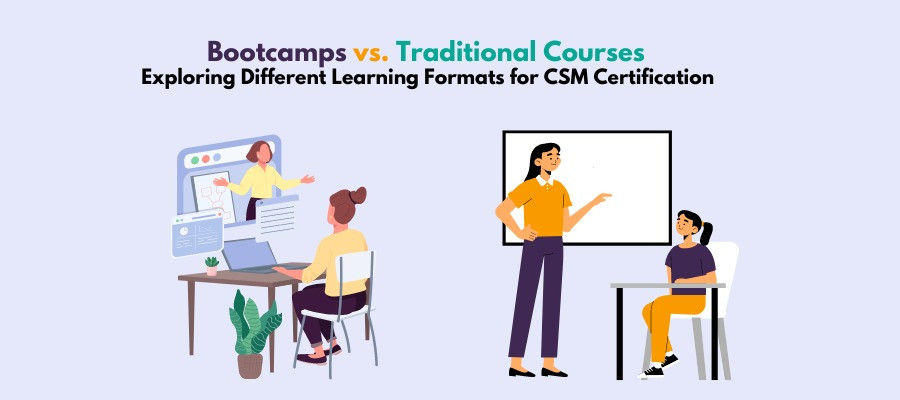Bootcamps vs. Traditional Courses: Exploring Different Learning Formats for CSM Certification

Are you considering getting your Certified ScrumMaster (CSM) certification but unsure which learning format suits you best? Choosing between bootcamps and traditional courses will be difficult when you find various CSM training providers online. Understandably, both are unique methods that follow different teaching styles and techniques. So, when should you attend a boot camp, and when should you enroll in online courses? In this article, we'll explore both formats to help you decide!
Why Choose the Right Learning Format For Your CSM Certification?
Selecting the suitable learning format for your CSM certification is crucial. It impacts how effectively you grasp Scrum principles and how well you can apply them in real-world scenarios. Whether you're a busy professional seeking a quick, intensive learning experience or prefer a more gradual, comprehensive approach, understanding the differences between bootcamps and traditional courses is essential.
What Are Bootcamps? Are They Good Enough For Achieving CSM Certification?
Bootcamps are intensive, short-term training programs designed to teach specific skills quickly. Typically lasting a few days to a few weeks, they focus on immersive, hands-on learning and provide concentrated training on Scrum principles, roles, and practices for CSM certification.
Key Features of Bootcamps:
- Intensive Learning: Bootcamps offer a short period of deep study of the subject matter. This can be highly effective for learners who want to grasp and apply concepts immediately.
- Hands-On Approach: The emphasis on practical exercises, real-world scenarios, and interactive sessions ensures that participants grasp Scrum practices well.
- Networking Opportunities: Bootcamps attract professionals from various industries, providing valuable networking opportunities and peer learning.
- Focused Environment: Being away from daily distractions allows learners to concentrate fully on the course material.
Who Should Choose Bootcamps?
- Busy Professionals: Those with limited time need to learn quickly and effectively.
- Fast Learners: Individuals who thrive in an accelerated learning environment and can absorb information rapidly.
- Immediate Application: Professionals must apply Scrum principles immediately in their work settings.
What Are Traditional Courses? Why Should You Attend?
Traditional courses follow a more extended, structured curriculum. These programs span several weeks to months and include lectures, readings, assignments, and exams. Universities, professional training organizations, and online learning platforms often offer traditional courses.
Key Features of Traditional Courses:
- Comprehensive Curriculum: Traditional courses offer a broad and in-depth exploration of Scrum principles, providing a solid theoretical foundation.
- Paced Learning: The extended duration allows for gradual learning and better retention of information.
- Instructor Support: Access to experienced instructors who can provide personalized guidance and feedback.
- Flexibility: Many traditional courses offer flexible schedules, including evening or weekend classes and online options.
Who Should Choose Traditional Courses?
- Deep Learners: Those who prefer a thorough understanding of concepts and enjoy a more detailed learning process.
- New to Agile: Individuals new to Agile and Scrum who need more time to absorb and understand the principles.
- Structured Learning: Learners who benefit from a structured, paced approach with consistent support and feedback.
Comparing Bootcamps and Traditional Courses:
Now, let’s compare the two learning styles so that you can find one suitable for your CSM certification preparations!
Learning Pace and Style:
Bootcamps: Fast-paced, immersive learning ideal for those who can dedicate full-time attention for a short period.
Traditional Courses: Gradual, structured learning suited for those who prefer a steady pace with consistent reinforcement.
Cost:
Bootcamps: Often more expensive due to the intensive nature and shorter duration. However, the quick turnaround can be cost-effective for professionals.
Traditional Courses: These can be less expensive, especially if taken through online platforms or as part of continuing education programs. The longer duration can spread out the cost.
Time Commitment:
Bootcamps Require a short-term, full-time commitment, making them suitable for those who can take time off work.
Traditional Courses Fit well into a busy schedule. Classes are typically spread over weeks or months, allowing learners to balance work and study.
Bootcamps Or Traditional Courses: Which Is Right for You?
Choosing between boot camps and traditional courses for CSM certification depends on your learning style, schedule, and professional needs. A boot camp might be the best fit if you thrive in an intensive, hands-on environment and need to apply Scrum principles quickly. However, a traditional course may be more suitable if you prefer a thorough, paced learning experience with ongoing support.
Ultimately, both formats can effectively prepare you for the CSM certification. Consider your preferences, professional goals, and time availability to make the best choice for your learning journey. Happy learning!
Reference:
https://www.scrumalliance.org/courses-events/search?ctyp=Csm
https://medium.com/@jineshvora.bia/bootcamps-vs-university-courses-choosing-the-right-learning-format-for-you-880e07b3b3e4
https://www.scrumalliance.org/get-certified/scrum-master-track



